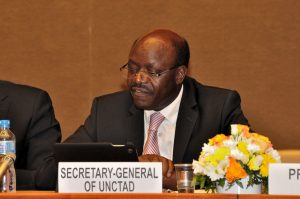
The seventh Global Commodities Forum, jointly organized by UNCTAD, the Commonwealth Secretariat and the Food and Agriculture Organization of the United Nations, was held in Nairobi, Kenya as part of the fourteenth session of the United Nations Conference on Trade and Development.
Under the theme ‘Breaking the chains of commodity dependence’, the forum discussed how commodity-dependent developing countries could adapt to the twin shocks of lower commodity prices and increased macroeconomic pressures, so as to realize their national objectives and the 2030 Agenda for Sustainable Development.
The forum is a free public platform where critical issues at the intersection of commodities and development can be explored. With the input of experts, it helps frame international policy discussions on commodities and the challenges faced by developing countries.
As a multi-stakeholder dialogue, the forum attracts high-level decision makers and experts from the public, private and civil society sectors. The forum featured an opening session, a keynote session, four expert panels and a ministerial round table.
This report summarizes the individual sessions and concludes with policy recommendations for developing countries. Opening session The Secretary-General of UNCTAD, Mr. Mukhisa Kituyi, opened the Global Commodities Forum.
The Forum was an opportunity to revisit the commodities problematic at the fourteenth session of the United Nations Conference on Trade and Development, 40 years after member States had made a concerted effort to address commodity dependence at the fourth session of the Conference in Nairobi in 1976.
At the fourth session of the Conference, member States agreed on market access considerations for developing countries and adopted the Integrated Programme for Commodities, with the expectation that these would help commodity-dependent developing countries grow and transform their economies.
Four decades later, Secretary General Kituyi highlighted the small number of success stories of countries – Chile, Malaysia and Norway, for example – that had transformed their economies, breaking their dependence on commodities.
Indeed, many challenges facing commodity-dependent developing countries had remained unchanged over the past 40 years. For example, they were still dependent on the vagaries of the boom-bust cycle of commodity prices.
Rents from natural resources continued to compromise long-term visions in many countries, either by distracting leaders from the need to diversify their economies, or by motivating rent-seeking behaviour. Among the new phenomena affecting commodity dependence, the Secretary-General said that information and communications technologies (ICTs) had proven to be a double-edged sword for commodity-dependent developing countries.
On the one hand, ICTs had flattened the value chain, making trade in commodities cheaper and more accessible. On the other, ICTs had been used to facilitate illicit trade from developing countries, undermining their regulatory strength and the fiscal resources they had to devote to their development priorities.
These flows had grown to such a scale that stemming them was now a priority for commodity dependent developing countries, alongside diversification and value addition.
Despite the few success stories of the last 40 years and the renewed difficulties facing those countries, the Secretary-General expressed optimism at the continued growth in understanding and expertise on the causes of commodity dependence and strategies to overcome them.
“Among least developed countries, persistently high commodity dependence restrains the structural transformation of their economies, a prerequisite for achieving sustainable growth and development.” Gyan Chandra Acharya Under-Secretary-General, United Nations Office of the High Representative for the Least Developed Countries, Landlocked Developing Countries and Small Island Developing States .
The panel was composed of the following speakers: Mr. Gyan Chandra Acharya, Under-Secretary-General and High Representative for the Least Developed Countries, Landlocked Developing Countries and Small Island Developing States; Mr. Yonov Frederick Agah, Deputy Director General, World Trade Organization; Ms. Arancha González, Executive Director, International Trade Centre;1 and Mr. Deodat Maharaj, Deputy Secretary-General for Economic and Social Development, Commonwealth Secretariat.
The moderator was Mr. Adan Mohammed, Cabinet Secretary, Ministry of Industry, Trade and Cooperatives, Kenya.
Mr. Maharaj called for renewed emphasis on good governance and local content in commodity-dependent developing countries.
The recent boom had bred euphoria and a delusion of permanence that, coupled with a lack of transparency and accountability, had led to rent leakages through transfer pricing and corruption, for example. Leakages in developing countries were estimated at $1 trillion per year and the financing gap, at $2 trillion per year.
In his view, good governance rested on a Government having a long-term vision for the development of its economy and society. Such a vision imposed practical discipline, guiding a progression of investments and policies towards an end goal.
It also imposed political discipline so that, during boom or bust, the Government maintained clear development priorities and contained rent leakages.
Mr. Maharaj encouraged governments to place human capital – investments in their citizens – at the centre of their development visions. Singapore, for example, was a country whose diligent pursuit of a long-term vision was based on human capital, and it had achieved an enviable level of economic and societal development for its citizens.
Mr. Acharya urged all member States to respond to the deteriorating macroeconomic and market conditions facing commodity dependent developing countries.
Countries must prioritize the diversification of their economies, but this would only be possible through market access and support from the international community. Indeed, because of the universality of the Sustainable Development Goals, unprecedented multi-stakeholder collaboration would be essential to achieve them.
Mr. Agah said that the commodities problematic was a developmental one. This was reflected in trade negotiations at WTO, with market-oriented disciplines that took into account the development priorities of producers in developing countries, as well as the preservation of Governments’ policy space.
Food security, a major concern among developing countries, was a priority theme in both the recent agreements in Bali (2013) and Nairobi (2015) that gave Governments flexibility in supporting small and/or poor farmers.
Further, duty levels had fallen in commodity markets due to WTO disciplines, although tariff escalation remained a major challenge.
In the view of Ms. González, the global development agenda should focus on agriculture, which employed more than 70 per cent of the world’s poor, the majority of them women.
Agricultural development could therefore simultaneously boost productivity and growth and reduce poverty. A focus on vulnerable farmers implied a shift in development strategies to focus less on manufacturing based industrialization and more on value addition.
To do so, it was important to increase the enabling services provided to farmers, such as credit, market information, mentoring and business training, and extension services.
Governments should structure the agricultural sector around multi-stakeholder platforms to increase efficiency and collaboration; and countries should develop regional value chains, invest in trade facilitation, traceability and technology at home, while harmonizing policies and infrastructure plans at the regional level.
African Eye Report





